ProfPhilippestudyshop
On this page, you find all documents, package deals, and flashcards offered by seller philipperashfordgitonga.
- 12
- 0
- 0
Community
- Followers
- Following
12 items

Lehne's Pharmacotherapeutics for Advanced Practice Providers,
A patient with schizophrenia receives a dose of risperidone [Risperdal Consta] IM. The nurse teaching this patient about this medication will make which statement? a. “You will experience therapeutic levels of this drug in 1 to 2 weeks.” b. “You will need injections of this drug every 6 weeks.” c. “You will need to take an oral antipsychotic drug for 3 weeks.” d. “You probably will not have extrapyramidal symptoms with this drug.” ANS: C Risperidone given intramuscularly i...
- Exam (elaborations)
- • 27 pages •
A patient with schizophrenia receives a dose of risperidone [Risperdal Consta] IM. The nurse teaching this patient about this medication will make which statement? a. “You will experience therapeutic levels of this drug in 1 to 2 weeks.” b. “You will need injections of this drug every 6 weeks.” c. “You will need to take an oral antipsychotic drug for 3 weeks.” d. “You probably will not have extrapyramidal symptoms with this drug.” ANS: C Risperidone given intramuscularly i...

Final Exam Study Guide
Prevention of osteoporosis with hormone replacement therapy o HT reduces postmenopausal bone loss and thereby decreases the risk for osteoporosis and related fractures. Unfortunately, when HT is stopped, bone mass rapidly decreases by approximately 12%. Hence to maintain bone health, HT must continue lifelong. As a result, the risk for harm is increased. Accordingly, alternative treatments are preferred
- Exam (elaborations)
- • 12 pages •
Prevention of osteoporosis with hormone replacement therapy o HT reduces postmenopausal bone loss and thereby decreases the risk for osteoporosis and related fractures. Unfortunately, when HT is stopped, bone mass rapidly decreases by approximately 12%. Hence to maintain bone health, HT must continue lifelong. As a result, the risk for harm is increased. Accordingly, alternative treatments are preferred
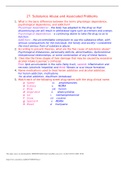
Substance Abuse and Associated Problems
What is the basic difference between the terms physiologic dependence, psychological dependence, and addiction? Physiologic dependence: - the body has adapted to the drug so that discontinuing use will result in withdrawal signs such as tremors and cramps. Psychological dependence: - a continuing desire to take the drug so as to function. Addiction: - the uncontrollable compulsion to use the substance often, with serious consequences for the indiv
- Exam (elaborations)
- • 1 pages •
What is the basic difference between the terms physiologic dependence, psychological dependence, and addiction? Physiologic dependence: - the body has adapted to the drug so that discontinuing use will result in withdrawal signs such as tremors and cramps. Psychological dependence: - a continuing desire to take the drug so as to function. Addiction: - the uncontrollable compulsion to use the substance often, with serious consequences for the indiv
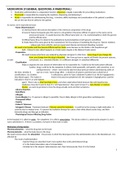
MEDICATION (9 GENERAL QUESTIONS, 8 PARENTERAL)
As nurses, we’re expected to know: - Name (Nomenclature) 1) Chemical Name (the precise description of the chemical composition of the drug) 2) Generic Name (Companies give this name to a drug before it becomes official; it’s given so the name can be pronounced easier. It usually becomes the official name later on.) So, Acetometaphine is both the generic name and the official name. 3) Official Name (How it is listed in the publications) Acetometophine is both generic and official. 4) T...
- Exam (elaborations)
- • 19 pages •
As nurses, we’re expected to know: - Name (Nomenclature) 1) Chemical Name (the precise description of the chemical composition of the drug) 2) Generic Name (Companies give this name to a drug before it becomes official; it’s given so the name can be pronounced easier. It usually becomes the official name later on.) So, Acetometaphine is both the generic name and the official name. 3) Official Name (How it is listed in the publications) Acetometophine is both generic and official. 4) T...
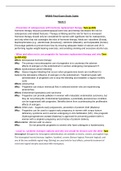
Final Exam Study Guide
Prevention of osteoporosis with hormone replacement therapy Tara (p.433) Hormone therapy reduces postmenopausal bone loss and thereby decreases the risk for osteoporosis and related fractures. Therapy is lifelong and the risk for harm is increased. Hormone therapy should only be considered for women with significant risk for osteoporosis, and only when that risk outweighs the risks of hormone therapy. Meds are: raloxifene (Evista), bisphosphonates (e.g., alendronate {Fosamax}), calcitonin (...
- Exam (elaborations)
- • 26 pages •
Prevention of osteoporosis with hormone replacement therapy Tara (p.433) Hormone therapy reduces postmenopausal bone loss and thereby decreases the risk for osteoporosis and related fractures. Therapy is lifelong and the risk for harm is increased. Hormone therapy should only be considered for women with significant risk for osteoporosis, and only when that risk outweighs the risks of hormone therapy. Meds are: raloxifene (Evista), bisphosphonates (e.g., alendronate {Fosamax}), calcitonin (...
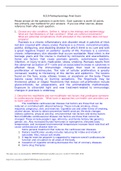
Pathophysiology Final Exam
. Choose any skin condition. Define it. What is the etiology and epidemiology. What are manifestations of that condition? What are common treatments? What are potential complications if left untreated or the condition does not heal properly? Psoriasis is a chronic inflammatory skin disorder result in patches of thick red skin covered with silvery scales. Psoriasis is a chronic, noncommunicable, painful, disfiguring, and disabling disease for which there is no cure and with a great negativ...
- Exam (elaborations)
- • 9 pages •
. Choose any skin condition. Define it. What is the etiology and epidemiology. What are manifestations of that condition? What are common treatments? What are potential complications if left untreated or the condition does not heal properly? Psoriasis is a chronic inflammatory skin disorder result in patches of thick red skin covered with silvery scales. Psoriasis is a chronic, noncommunicable, painful, disfiguring, and disabling disease for which there is no cure and with a great negativ...
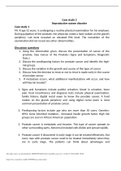
Reproductive system disorder
Mr. R age 52 years, is undergoing a routine physical examination for his employer. During palpation of the prostate, the physician noted a hard nodule on the gland’s periphery. Lab tests revealed an elevated PSA level. The remainder of the examination did not reveal any other abnormalities. Discussion questions 1. Using the information given, discuss the presentation of cancer of the prostate. (See Cancer of the Prostate—Signs and Symptoms, Diagnostic Tests.) 2. Discuss the predispos...
- Exam (elaborations)
- • 6 pages •
Mr. R age 52 years, is undergoing a routine physical examination for his employer. During palpation of the prostate, the physician noted a hard nodule on the gland’s periphery. Lab tests revealed an elevated PSA level. The remainder of the examination did not reveal any other abnormalities. Discussion questions 1. Using the information given, discuss the presentation of cancer of the prostate. (See Cancer of the Prostate—Signs and Symptoms, Diagnostic Tests.) 2. Discuss the predispos...

Acid Base Imbalances
Respiratory Acidosis PH: below 7.35 CO2: above 45 mm Hg HCO3: level normal if uncompensated or 28 mEq/L if compensated Headache, light-headedness, confusion, lethargy Administer oxygen, encourage coughing and deep breathing, maintain adequate hydration, watch potassium levels > 5.1 Respiratory Alkalosis PH: above 7.45 CO2: below 35 mm Hg HCO3: level normal if short lived or uncompensated or below 21 mEq/L if compensated Light-headedness, numbness, tingling of fingers, toes, a...
- Exam (elaborations)
- • 2 pages •
Respiratory Acidosis PH: below 7.35 CO2: above 45 mm Hg HCO3: level normal if uncompensated or 28 mEq/L if compensated Headache, light-headedness, confusion, lethargy Administer oxygen, encourage coughing and deep breathing, maintain adequate hydration, watch potassium levels > 5.1 Respiratory Alkalosis PH: above 7.45 CO2: below 35 mm Hg HCO3: level normal if short lived or uncompensated or below 21 mEq/L if compensated Light-headedness, numbness, tingling of fingers, toes, a...
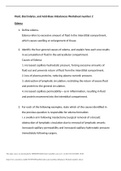
Fluid, Electrolytes, and Acid-Base Imbalances
2. Identify the four general causes of edema, and explain how each one results in accumulation of fluid in the extracellular compartment. Causes of Edema: 1. increased capillary hydrostatic pressure, forcing excessive amounts of fluid out and prevents return of fluid from the interstitial compartment. 2. loss of plasma proteins, reducing plasma osmotic pressure. 3. obstruction of lymphatic circulation, restricting the return of excess fluid and protein to the general circulation. 4. incr...
- Exam (elaborations)
- • 7 pages •
2. Identify the four general causes of edema, and explain how each one results in accumulation of fluid in the extracellular compartment. Causes of Edema: 1. increased capillary hydrostatic pressure, forcing excessive amounts of fluid out and prevents return of fluid from the interstitial compartment. 2. loss of plasma proteins, reducing plasma osmotic pressure. 3. obstruction of lymphatic circulation, restricting the return of excess fluid and protein to the general circulation. 4. incr...

CHEMICAL PATHOLOGY
Chemical Pathology not only brings together science and medicine, it relates to all the medical specialities. Chemical Pathologists are frequently consulted about further investigation or management of patients found to have biochemical abnormalities on 'routine' testing. They frequently have to deal with investigating patients with dyslipidaemias, diabetes and hypertension, review ward patients receiving artificial nutrition, discuss the introduction of a new diagnostic test with consulta...
- Exam (elaborations)
- • 397 pages •
Chemical Pathology not only brings together science and medicine, it relates to all the medical specialities. Chemical Pathologists are frequently consulted about further investigation or management of patients found to have biochemical abnormalities on 'routine' testing. They frequently have to deal with investigating patients with dyslipidaemias, diabetes and hypertension, review ward patients receiving artificial nutrition, discuss the introduction of a new diagnostic test with consulta...
